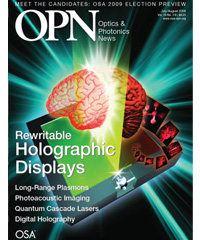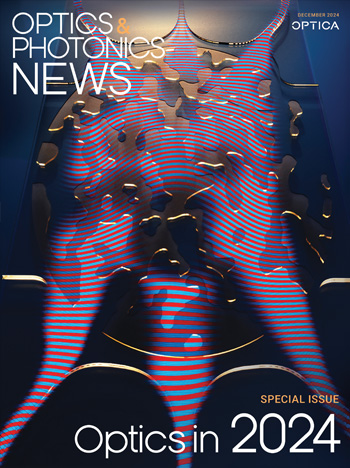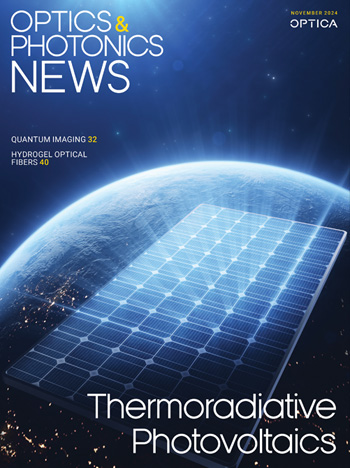
July/August 2008 Issue
Feature Articles
Rewritable Holographic 3D Displays
Researchers at the University of Arizona’s College of Optical Sciences and Nitto Denko Technical Corp. have created a rewriteable holographic display that may one day enable 3D holographic film.
by N. Peyghambarian, Savas Tay, Pierre-Alexandre Blanche, Robert Norwood and Michiharu YamamotoGuiding Light with Long-Range Plasmons
Long-range surface plasmons are characterized by unique electromagnetic properties that could reshape our vision of integrated optical circuits and other chip-scale photonic applications.
by Aloyse Degiron, Pierre Berini and David R. SmithPhotoacoustic Tomography and Microscopy
By converting light waves into sound, researchers have developed a high-resolution biological imaging technique that allows them to see living tissue at new depths.
by Lihong V. WangThe Quantum Cascade Laser: A Versatile and Powerful Tool
Many applications in the infrared are awaiting the right laser source. Advances in quantum cascade lasers will enable powerful new technologies to become commercial realities.
by Manijeh Razeghi, Steven Slivken, Yanbo Bai and Shaban Ramezani DarvishPhase-Shifting Digital Holography
Digital holography generally offers more flexibility than conventional holographic interferometry and speckle interferometry because of its simple setup and easy accessibility for 3D surfaces.
by Ichirou YamaguchiDepartments and Columns
With The Camera Lucida, You, Too, Can Be an Artist
“You Can Draw Your Family, Friends, Anything from REAL LIFE—Like An Artist…Even if You CAN’T DRAW a Straight Line!”
Better Polishing through Chemistry
Learning the chemical aspects of optical polishing can lead to better optics in less time.
Supercharging Microscope Resolution
Researchers have refined a micro-scope that allows them to image features far smaller than the diffraction limit of the light used and examine how a protein behaves inside a living cell.
Reminiscences
Photonics Research at Australia’s Swinburne University of Technology
The Centre for Micro-Photonics at Australia’s Swinburne University of Technology has emerged as a leader in interdisciplinary photonics education and research. OSA Fellow Barry Masters recounts his recent visit to this world-class institution.
The Next Step Toward Quantum Computers
The integrated circuit changed electronics dramatically. Could the integration of photonic circuits that demonstrate quantum behavior have similar effects on quantum computing?
Did You Know?
Two-dimensional colloidal crystals.

![An artist’s rendering of a pulse of circularly polarized light hitting a 2D semiconductor. [Illustration by S. Alvey / University of Michigan]](https://opnmedia.blob.core.windows.net/$web/opn/media/images/articles/2025/0125/departments/202501-cover-web.jpg?ext=.jpg)

